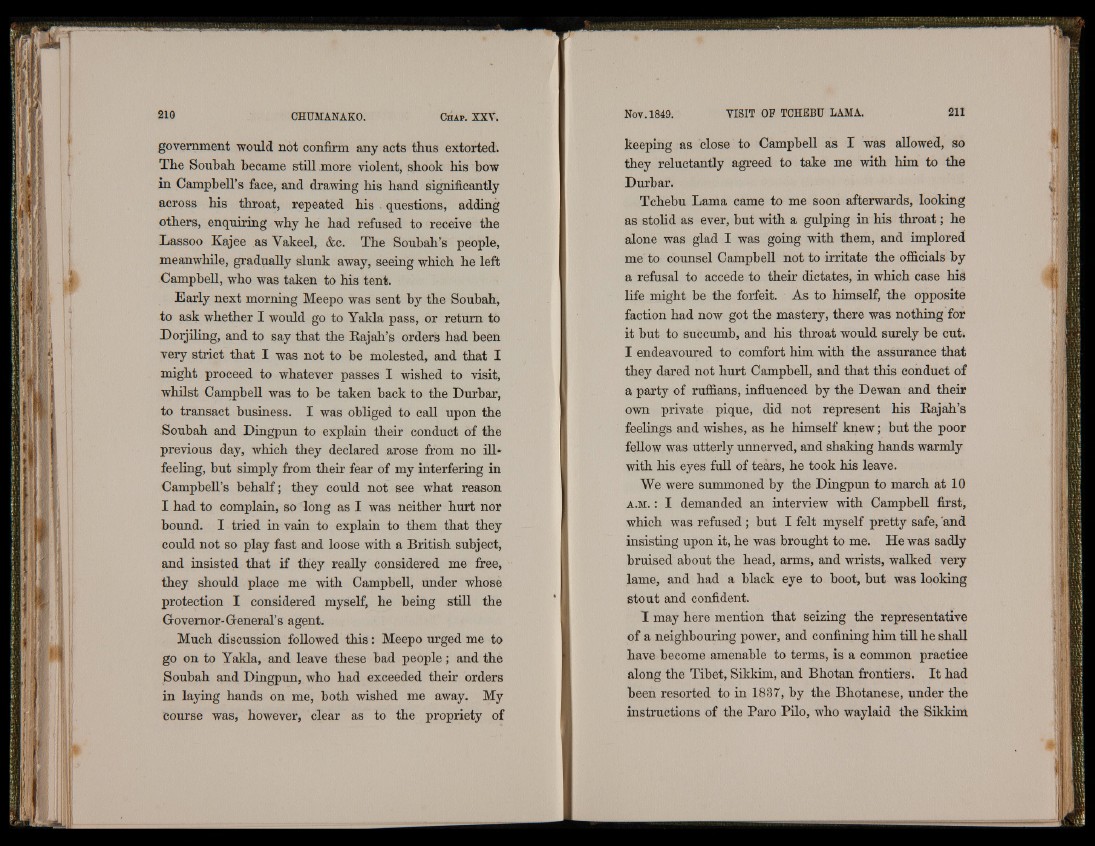
government would not confirm any acts thus extorted.
The Soubah became still .more violent, shook his how
in Campbell’s face, and drawing his hand significantly
across his throat, repeated his questions, adding
others, enquiring why he had refused to receive the
Lassoo Kajee as Vakeel, &c. The Soubah’s people,
meanwhile, gradually slunk away, seeing which he left
Campbell, who was taken to his tent.
Early next morning Meepo was sent by the Soubah,
to ask whether I would go to Yakla pass, or return to
Dorjiling, and to say that the Rajah’s orders had been
very strict that I was not to be molested, and that I
might proceed to whatever passes I wished to visit,
whilst Campbell was to be taken back to the Durbar,
to transact business. I was obliged to call upon the
Soubah and Dingpun to explain their conduct of the
previous day, which they declared arose from no ill-
feeling, but simply from their fear of my interfering in
Campbell’s behalf; they could not see what reason
I had to complain, so long as I was neither hurt nor
bound. I tried in vain to explain to them that they
could not so play fast and loose with a British subject,
and insisted that if they really considered me free,
they should place me with Campbell, under whose
protection I considered myself, he being still the
Governor-General’s agent.
Much discussion followed th is : Meepo urged me to
go on to Yakla, and leave these bad people; and the
Soubah and Dingpun, who had exceeded their orders
in laying hands on me, both wished me away. My
course was, however, clear as to the propriety of
keeping as close to Campbell as I was allowed, so
they reluctantly agreed to take me with him to the
Durbar.
Tchebu Lama came to me soon afterwards, looking
as stolid as ever, but with a gulping in his th ro a t; he
alone was glad I was going with them, and implored
me to counsel Campbell not to irritate the officials by
a refusal to accede to their dictates, in which case his
life might be the forfeit. As to himself, the opposite
faction had now got the mastery, there was nothing for
it but to succumb, and his throat would surely be cut.
I endeavoured to comfort him with the assurance that
they dared not hurt Campbell, and that this conduct of
a party of ruffians, influenced by the Dewan and their
own private pique, did not represent his Rajah’s
feelings and wishes, as he himself knew; but the poor
fellow was utterly unnerved, and shaking hands warmly
with his eyes full of tears, he took his leave.
We were summoned by the Dingpun to march at 10
a .m . : I demanded an interview with Campbell first,
which was refused; but I felt myself pretty safe, and
insisting upon it, he was brought to me. He was sadly
bruised about the head, arms, and wrists, walked very
lame, and had a black eye to boot, but was looking
stout and confident.
I may here mention that seizing the representative
of a neighbouring power, and confining him till he shall
have become amenable to terms, is a common practice
along the Tibet, Sikkim, and Bhotan frontiers. I t had
been resorted to in 1837, by the Bhotanese, under the
instructions of the Paro Pilo, who waylaid the Sikkim